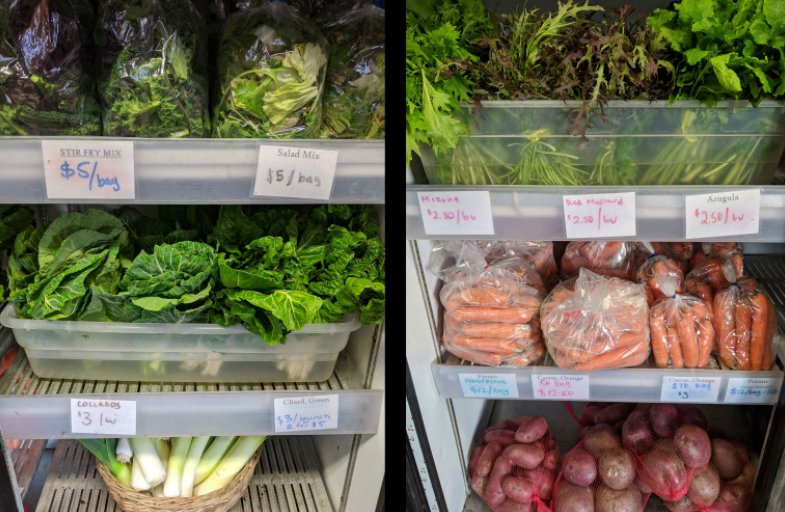WSU Extension, UW program, and local business come together to feed people during pandemic
 Cape Flattery Fishermen’s Cooperative, Washington State University Extension, and Washington Sea Grant are working together to provide healthy, locally-sourced fish to food banks around the Olympic Peninsula and other parts of northwest Washington.
Cape Flattery Fishermen’s Cooperative, Washington State University Extension, and Washington Sea Grant are working together to provide healthy, locally-sourced fish to food banks around the Olympic Peninsula and other parts of northwest Washington.
The cooperative, a local fishery based in Neah Bay, donated or sold over 4,500 pounds of fish to food banks in May and June. Their surplus of over 8,000 pounds of frozen true cod was due to the COVID-19 pandemic.
“We normally sell our fish all over United States and even in China, but that wasn’t an option after everything shut down,” said Hazel Secor, the manager of Cape Flattery. “We’re a small company and when we have fish that we can’t sell, we’re happy to donate or sell to a food bank. We just don’t want it to go to waste.”
The co-op is owned and operated by fishermen from the Makah tribe in and around Neah Bay. True cod is normally what you get when you order fish and chips at a restaurant, Secor said, calling it “light and tasty.”
WSU Extension works closely with Washington Sea Grant, a program of the University of Washington, in areas where agriculture and aquaculture overlap.
“We’ve been looking for ways to support local fisheries for the last few years,” said Karlena Brailey, a Community Health and Food Access Coordinator for WSU Extension. “We want people to be able to have local fish available. We want everyone on the peninsula to have access to this healthy protein source.”
Read more here: http://news.cahnrs.wsu.edu/article/wsu-extension-uw-program-and-local-business-come-together-to-feed-people-during-pandemic/
Fund awards $26,000 to small farms in area
 The Olympic Peninsula Farmers Fund has awarded a total of $26,650 to seven small farms in Jefferson County so they can provide locally grown produce, meat, eggs, and dairy products to food banks and local feeding programs.
The Olympic Peninsula Farmers Fund has awarded a total of $26,650 to seven small farms in Jefferson County so they can provide locally grown produce, meat, eggs, and dairy products to food banks and local feeding programs.
The fund was created as a partnership between the North Olympic Development Council, the WSU Extension Regional Small Farms Program, the North Olympic Land Trust and the Jefferson Land Trust to provide pre-paid, long-term contracts of $1,500 to $5,000 to farmers this season.
Farmers will in turn provide food for food banks and local feeding programs over the next three to five years.
Seven farms in Jefferson County received a contract: Red Dog, Midori, Spring Rain, Sunfield Land for Learning, Corona, and Mystery Bay farms.
“The [Tri-Area] Food Bank is located across the street from our farm and for a long time we’ve been working with the Food Bank as well as the people that manage it to try to get them to source more of their fresh produce locally,” said John Bellow, owner of Spring Rain Farm & Orchard.
“The whole point of our business is to provide food to our community. As a business we have to balance the books each year which puts some finite limits on how much we can donate to the Food Bank.”
This new contract means Spring Rain will receive funding needed to be able to give food directly to the Food Bank on a regular basis over the next five years.
Like many local businesses, farmers have been affected by the coronavirus pandemic. Farmers markets and restaurants make up more than half of a farm’s sales every year, according to the North Olympic Development Council (NODC).
Read more here: https://www.ptleader.com/stories/fund-awards-26000-to-small-farms-in-area,69784
WSU-supported Broadband Action Team draws interest from FCC chairman
 People nationwide depend on the Internet to go to work or school, maintain their health, and take care of loved ones. For residents of rural, Tribal, and other underserved areas, however, smooth, speedy access to the Internet isn’t always a given.
People nationwide depend on the Internet to go to work or school, maintain their health, and take care of loved ones. For residents of rural, Tribal, and other underserved areas, however, smooth, speedy access to the Internet isn’t always a given.
In the northeast corner of Washington state, Washington State University Extension is leading a collaborative effort to reveal gaps in broadband availability in underserved areas, in hopes of providing more access, affordability, and use. Efforts by the Stevens County-Spokane Tribe Broadband Action Team (BAT) are now drawing the interest of Federal Communications Commission Chairman Ajit Pai.
On Thursday, June 11, Pai joined 5th District U.S. Rep. Cathy McMorris Rodgers in a virtual meeting with local Broadband Action Team members. Team leader and WSU Stevens County Extension Director Debra Hansen, Stevens County Commissioner Wes McCart, Colville School District Superintendent Pete Lewis, other BAT members, and Washington State Broadband Office Director Russ Elliott shared grassroots efforts to survey broadband access in their largely rural communities.
“High-speed Internet is a lifeline for residents in rural communities, especially in the era of COVID-19,” Hansen said. “But rural areas are often lacking in connectivity, for a variety of reasons—dispersed populations, rugged terrain, harsh weather, and poverty and unemployment.”
Read more here: https://news.wsu.edu/2020/06/16/wsu-supported-broadband-action-team-draws-interest-fcc-chairman/
Drive-In WiFi hotspot available for free internet
 This project was launched in collaboration with Washington State University Extension, the Washington State Library, part of the Washington Office of the Secretary of State, and the Washington State Broadband Office. Equipment for the first 15 sites was generously donated by Microsoft. Counties participating in this first phase of this project include Asotin, Clallam, Ferry, Garfield, Grant, Grays Harbor, Island, Okanogan, Pend Oreille, Pierce, Skamania, Stevens, Wahkiakum, and Yakima.
This project was launched in collaboration with Washington State University Extension, the Washington State Library, part of the Washington Office of the Secretary of State, and the Washington State Broadband Office. Equipment for the first 15 sites was generously donated by Microsoft. Counties participating in this first phase of this project include Asotin, Clallam, Ferry, Garfield, Grant, Grays Harbor, Island, Okanogan, Pend Oreille, Pierce, Skamania, Stevens, Wahkiakum, and Yakima.
Over the next few weeks, Phase Two additional sites will be offered at WSU Extension offices, libraries, schools, and other locations across the state. Phase Three is dependent on funding and site selection based on areas of need. Efforts are underway to identify sites that meet those with the greatest need through a selection process that includes school free and reduced lunch programs data and reported regional unserved access areas.
“We are delighted to offer this free internet access in our community. COVID-19 has shown a light on how critical broadband is for our economy, educational needs and quality of life for all our residents,” said Backman.
A State Drive-In WiFi Hotspot locations map created in collaboration with the OCIO (Office of the Chief Information Officer) and WaTech will be available at http://www.driveinwifi.wa.gov. This map will be continually updated as new sites are offered across the state.
Though this project does not expand networks to homes or businesses, it does offer an immediate source for internet in regional locations for citizens, students, and workers during the COVID-19 emergency. The project partners and supporters are committed to continuing work beyond this crisis to ensure all in Washington have access to affordable, reliable broadband and the skills to successfully use it.
Read more here: https://www.waheagle.com/story/2020/05/14/wahkiakum-people/drive-in-wifi-hotspot-available-for-free-internet/17819.html
Extension office offers free drive-in Wi-Fi hotspots
 A free drive-in Wi-Fi hotspot is installed and operating at the WSU Okanogan County Extension office at 1234 Second Ave. S., in Okanogan, thanks to the combined efforts of public and private enterprise.
A free drive-in Wi-Fi hotspot is installed and operating at the WSU Okanogan County Extension office at 1234 Second Ave. S., in Okanogan, thanks to the combined efforts of public and private enterprise.
The Okanogan site is one of 15 locations around the state that is offering the temporary free service in response to the COVID-19 restrictions. Other hotspots are being installed at locations in Asotin, Clallam, Ferry, Garfield, Grant, Grays Harbor, Island, Pend Oreille, Pierce, Skamania, Stevens, Wahkiakum, and Yakima counties.
“There is a specific emphasis on student access but (the service) is available to all residents,” a WSU Okanogan County Extension media release said. “In addition to access for remote learning, it can be used for job searches, telehealth, telework, unemployment filing, census participation and other uses.”
The anticipated hotspot coverage area around the access point is 1,000-2,000 feet in diameter and includes network security protocols.
“When you log on you will be asked to identify your uses such as education, telehealth, job search or government services,” said Kayla Wells, WSU Okanogan County Extension Director. “This information will help determine the important reasons we need to increase broadband availability to homes and businesses in our area.”
Microsoft donated the equipment for the project in and collaboration with WSU Extension, the state library, state broadband office and office of Secretary of State launched the first of a multi-phase program to broaden access to other locations across the state.
Read more here: https://www.qcherald.com/news/extension-office-offers-free-drive-wi-fi-hotspots
Crowdsourcing our broadband access
 As social isolation continues to force people to live, work and learn from home, a fast internet connection is more important now than ever before. However, for many people living in the Inland Northwest, residential internet access is an issue and it’s more evident now during the COVID-19 pandemic.
As social isolation continues to force people to live, work and learn from home, a fast internet connection is more important now than ever before. However, for many people living in the Inland Northwest, residential internet access is an issue and it’s more evident now during the COVID-19 pandemic.
Washington State University Stevens County Extension / Spokane Tribe Broadband Action Team is collaborating with the Spokane Tribe Telecom Exchange (STTX) in announcing the formal public kickoff of a crowdsourcing project to determine who has residential internet service in Stevens County and the Spokane Tribe Reservation. The one-minute speed test can be done from any computer or mobile device connected to a home internet network.
“STTX has been working with WSBO and GEO Partners and we are excited to be collecting this additional data,” states Robin Kennedy, CEO of the Spokane Tribe Telecom Exchange.
The data collected will help with the future planning and funding for broadband projects. Stevens County and the Spokane Tribe Reservation is home to over 6,400 K-12 and college students as well as parents required to work from home. The crowdsourcing project will provide the most accurate collection of internet speeds while demand of internet usage is the highest.
“We’ve done speed test before, but this time it’s better,” said Debra Hansen, director of WSU Stevens County Extension and coordinator of the SC/ST BAT. “This test is different from others we’ve asked you to do: the technology has improved, GEO partners has the ability to analyze and plan future projects, and we have a new Washington State Broadband Office that is here to support us moving forward.”
Read more here: https://news.wsu.edu/2020/05/14/crowdsourcing-broadband-access/
Public “drive-up” WiFi hot spots now available across the state, including Kitsap County
 A statewide effort is underway to ensure all Washingtonians, whether they live in urban or rural areas, have access to broadband WiFi while maintaining appropriate social distancing practices.
A statewide effort is underway to ensure all Washingtonians, whether they live in urban or rural areas, have access to broadband WiFi while maintaining appropriate social distancing practices.
At 441 locations around the state, residents will be able to stay in their cars while accessing high-speed Internet. During a teleconference and Facebook Live event earlier this week, key figures in the effort to bridge the “digital divide” remoted in from around the state.
“The purpose of these drive-up WiFi spots is that people can stay in their cars, stay safe and connect,” said Lisa Brown, Director of the Washington State Commerce Department, as she called in via video chat from the Washington State University extension parking lot in Newport in Pend Oreille County on the Idaho border. “And we all know how important that is right now, especially during this really challenging period of time.”
But in more rural areas with fewer libraries, WiFi access can be found at other locations such as the Port of Allyn dock and Grapeview Fire Station in Mason County or the Walmart and JC Penney parking lots in Sequim.
When the project is complete, Washington is expected to have 600 public hotspots available, said Russ Elliott, the state’s broadband director.
Read more here: https://www.kitsapdailynews.com/news/public-drive-up-wifi-hot-spots-now-available-across-the-state-including-kitsap-county/
Extension food safety experts share ways to protect your family, community during covid‑19
As communities nationwide accept the ongoing reality of social distancing to prevent the spread of covid-19, people still need to shop for groceries, plan meals, and feed their families.
 To help Northwest residents make informed choices to protect themselves and others, a team of educators with Washington State University Extension have put together a set of covid-19 related food-focused tip sheets, podcasts and videos. These and many other food-related covid-19 resources are available on the WSU Extension Consumer Food Safety website.
To help Northwest residents make informed choices to protect themselves and others, a team of educators with Washington State University Extension have put together a set of covid-19 related food-focused tip sheets, podcasts and videos. These and many other food-related covid-19 resources are available on the WSU Extension Consumer Food Safety website.
“We noticed a gap between what is currently known about preventing the spread of covid-19, and the food-related consumer behaviors we were observing in the media and in our communities,” said Zena Edwards, food safety and nutrition educator with WSU Clark and Cowlitz County Extension.
Although specific social distancing restrictions and recommendations have shifted over time, what is known about how the virus spreads has remained fairly consistent — person to person contact via respiratory droplets. Edwards and her colleagues stressed the need for continued social distancing, staying home as much as possible, using a cloth face cover when around others, good hand hygiene, and proper cleaning and disinfecting of frequently touched surfaces.
“This has been a stressful time for many people,” said Susie Craig, WSU Extension Area food safety specialist. “We hope we can help alleviate some of that anxiety by providing resources that help people focus on the most important risk reduction practices for grocery shopping, meal planning, food storage, cleaning and sanitizing.
Library hotspots available
More Wi-Fi hotspots are available at public libraries throughout Clallam County.
 The Forks Library parking lot at 171 S. Forks Ave. is one of 15 locations in the state to offer free, temporary emergency internet service in the first phase of Drive-In WiFi Hotspots.
The Forks Library parking lot at 171 S. Forks Ave. is one of 15 locations in the state to offer free, temporary emergency internet service in the first phase of Drive-In WiFi Hotspots.
The WiFi hotspot is supported locally by the North Olympic Library System — which oversees public libraries in Port Angeles, Sequim, Clallam Bay and Forks — and WSU Clallam County Extension.
The emphasis is on student access, said Noah Glaude, assistant library director, but WiFi is available to all residents who need it for such reasons as job searches, telehealth, telework, unemployment filing, census participation and other uses.
Read more here: https://www.peninsuladailynews.com/news/library-hotspots-available/
Clallam County renews contract with WSU Extension
Clallam County commissioners have renewed a contract with Washington State University Extension to provide educational programs for county residents.
 Commissioners approved Tuesday a long-standing memorandum of agreement with the land-grant university at a one-year cost of $172,098.
Commissioners approved Tuesday a long-standing memorandum of agreement with the land-grant university at a one-year cost of $172,098.
WSU Extension offers such programs as Food and Farms, Community Health, Master Gardeners, 4-H/Youth Development and Waste Reduction.
“They are great programs,” Commissioner Randy Johnson said.
Clallam County Extension Director Clea Rome said her department had been working with partners on community food systems during the COVID-19 crisis.
WSU Extension is partnering with the North Olympic Development Council and the Clallam and Jefferson County land trusts to establish a dedicated fund to help farmers during the coronavirus pandemic, Rome said.
“They can use the money right now for whatever they need, whether it be seeds, whether it be upgrades in equipment,” Rome told commissioners last week.
“They pay back that money through donations to the food banks and food pantries over five years, so they have plenty of seasons to kind of make up that little flush of income.”
Read more here: https://www.peninsuladailynews.com/news/clallam-county-renews-contract-with-wsu-extension/
Drive-In WiFi Hotspot in Aberdeen Offers Free Internet
In response to the impacts of COVID-19, new Drive-In WiFi Hotspots provide free temporary, emergency internet access for Washingtonians who do not have broadband service to their homes.
 Our Grays Harbor County site has been selected as one of the initial fifteen locations in Washington to participate in the project. It provides wireless internet access at Aberdeen’s The Shoppes at Riverside in the parking area located near the food court entrance. There is a specific emphasis on student access but is available to all residents. In addition to access for remote learning, it can be used for job searches, telehealth, telework, unemployment filing, census participation and other uses. The site is located at 1017 South Boone Street in Aberdeen. This WiFi hotspot is supported locally by WSU Extension, Greater Grays Harbor Inc., and Grays Harbor College.
Our Grays Harbor County site has been selected as one of the initial fifteen locations in Washington to participate in the project. It provides wireless internet access at Aberdeen’s The Shoppes at Riverside in the parking area located near the food court entrance. There is a specific emphasis on student access but is available to all residents. In addition to access for remote learning, it can be used for job searches, telehealth, telework, unemployment filing, census participation and other uses. The site is located at 1017 South Boone Street in Aberdeen. This WiFi hotspot is supported locally by WSU Extension, Greater Grays Harbor Inc., and Grays Harbor College.
Anticipated WiFi coverage area is 1000-2000 feet diameter around each access point. Each location will include network security protocols and promote Governor Jay Inslee’s social distancing requirements during the COVID-19 outbreak. You are asked to respect the property of those who have offered its availability.
Dan Teuteberg, the County Director of WSU Extension Grays Harbor, said “when you log on you will be asked to identify your uses such as education, telehealth, job search or government services. This information will help determine the important reasons we need to increase broadband availability to homes and businesses in our area.”
This project was launched in collaboration with Washington State University Extension, the Washington State Library, part of the Washington Office of the Secretary of State, and the Washington State Broadband Office. Equipment for the first 15 sites was generously donated by Microsoft. Counties participating in this first phase of this project include Asotin, Clallam, Ferry, Garfield, Grant, Grays Harbor, Island, Okanogan, Pend Oreille, Pierce, Skamania, Stevens, Wahkiakum, and Yakima.
Read more here: https://kbkw.com/drive-in-wifi-hotspot-in-aberdeen-offers-free-internet/
Farm stands sprouting with renewed sales
 Buying products such as salad mix, tulips or beef direct from a nearby grower supports the local economy, noted Clea Rome, director of the Washington State University Extension in Clallam County.
Buying products such as salad mix, tulips or beef direct from a nearby grower supports the local economy, noted Clea Rome, director of the Washington State University Extension in Clallam County.
“These farmers are small businesses,” she said, adding that it’s more important than ever to engage with local food providers in the midst of the coronavirus pandemic.
Read more here: https://www.peninsuladailynews.com/news/farm-stands-sprouting-with-renewed-sales/
For Wash., Working from Home Isn’t Possible Without Internet
For Nils Johnson, accessing the internet for work requires driving down a hill and pointing his vehicle toward a data antenna to obtain a signal.
 Johnson, who lives south of Chewelah, had internet at home via a Verizon hotspot, which provided access to Zoom meetings, email and Netflix. That service disappeared in November, and Johnson is unable to work out of his office in town because he is caring for his children, who are learning from home as a result of COVID-19 school closures.
Johnson, who lives south of Chewelah, had internet at home via a Verizon hotspot, which provided access to Zoom meetings, email and Netflix. That service disappeared in November, and Johnson is unable to work out of his office in town because he is caring for his children, who are learning from home as a result of COVID-19 school closures.
Communication is imperative for Johnson, who transports local produce to food pantries, grocery stores and gas stations as an agriculture extension coordinator for Washington State University’s Stevens County Extension.
“I’m used to working out of my vehicle, but this is taking it to a whole new level,” he said. Johnson is among many residents in rural communities nationwide with limited or nonexistent internet access because of the lack of infrastructure and cost of installing fiber optics or cell towers.
Read more here: https://www.governing.com/community/For-Wash-Working-from-Home-Isnt-Possible-Without-Internet.html
WiFi hotspots in Washington a priority for WSU Extensions
The COVID-19 pandemic has shone a light on the internet needs of rural Washington in particular.
 In Washington, nearly one in 10 rural residents lack access to high-speed broadband, according to Washington State University Extension. Nationally, about 15 percent of rural Americans are offline.”
In Washington, nearly one in 10 rural residents lack access to high-speed broadband, according to Washington State University Extension. Nationally, about 15 percent of rural Americans are offline.”
WSU is taking part in the Drive-In WiFi Hotspots project partnered with multiple agencies including public utility districts, Washington State Library, the Office of the Superintendent of Public Instruction, and more.
“Microsoft and the Avista Foundation are providing funding, and a national nonprofit contributed equipment and installation,” a description of the project on the Washington State Department of Commerce website says. The site includes a map of WiFi hotspots.
As a land-grant college, the mission of WSU Extensions is to make education, particularly about agriculture, more accessible “so that members of the working classes could obtain a liberal, practical education,” a WSU description reads, and the Drive-In WiFi Hotspots project fits into that mission.
Extension food safety experts share ways to protect your family, community during COVID-19
As communities nationwide accept the ongoing reality of social distancing to prevent the spread of COVID-19, people still need to shop for groceries, plan meals, and feed their families.
 To help Northwest residents make informed choices to protect themselves and others, a team of educators with Washington State University Extension have put together a set of COVID-19 related food-focused tip sheets, podcasts and videos. These and many other food-related COVID-19 resources are available on the WSU Extension Consumer Food Safety website.
To help Northwest residents make informed choices to protect themselves and others, a team of educators with Washington State University Extension have put together a set of COVID-19 related food-focused tip sheets, podcasts and videos. These and many other food-related COVID-19 resources are available on the WSU Extension Consumer Food Safety website.
“We noticed a gap between what is currently known about preventing the spread of COVID-19, and the food-related consumer behaviors we were observing in the media and in our communities,” said Zena Edwards, Food Safety & Nutrition Educator with WSU Clark and Cowlitz County Extension.
Although specific social distancing restrictions and recommendations have shifted over time, what is known about how the virus spreads has remained fairly consistent—person to person contact via respiratory droplets. Edwards and her colleagues stressed the need for continued social distancing, staying home as much as possible, using a cloth face cover when around others, good hand hygiene, and proper cleaning and disinfecting of frequently touched surfaces.
Read more here: https://news.wsu.edu/2020/05/12/wsu-extension-food-safety-experts-share-ways-protect-family-community-covid-19/
Grays Harbor County ‘Drive-In WiFi Hotspot’ Available for Free Internet Use
In response to the impacts of COVID-19, new Drive-In WiFi Hotspots provide free temporary, emergency internet access for Washingtonians who do not have broadband service to their homes.
 Our Grays Harbor County site has been selected as one of an initial 15 locations in Washington to participate in the project. It provides wireless internet access at Aberdeen’s The Shoppes at Riverside in the parking area located near the food court entrance. There is a specific emphasis on student access but is available to all residents. In addition to access for remote learning, it can be used for job searches, telehealth, telework, unemployment filing, census participation and other uses. The site is located at 1017 South Boone Street in Aberdeen. This WiFi hotspot is supported locally by WSU Extension, Greater Grays Harbor Inc., and Grays Harbor College.
Our Grays Harbor County site has been selected as one of an initial 15 locations in Washington to participate in the project. It provides wireless internet access at Aberdeen’s The Shoppes at Riverside in the parking area located near the food court entrance. There is a specific emphasis on student access but is available to all residents. In addition to access for remote learning, it can be used for job searches, telehealth, telework, unemployment filing, census participation and other uses. The site is located at 1017 South Boone Street in Aberdeen. This WiFi hotspot is supported locally by WSU Extension, Greater Grays Harbor Inc., and Grays Harbor College.
Anticipated WiFi coverage area is 1000-2000 feet diameter around each access point. Each location will include network security protocols and promote Governor Jay Inslee’s social distancing requirements during the COVID-19 outbreak. You are asked to respect the property of those who have offered its availability.
Dan Teuteberg, the County Director of WSU Extension Grays Harbor, said “when you log on you will be asked to identify your uses such as education, telehealth, job search or government services. This information will help determine the important reasons we need to increase broadband availability to homes and businesses in our area.”
This project was launched in collaboration with Washington State University Extension, the Washington State Library, part of the Washington Office of the Secretary of State, and the Washington State Broadband Office. Equipment for the first 15 sites was generously donated by Microsoft. Counties participating in this first phase of this project include Asotin, Clallam, Ferry, Garfield, Grant, Grays Harbor, Island, Okanogan, Pend Oreille, Pierce, Skamania, Stevens, Wahkiakum, and Yakima.
Read more here: http://www.graysharbortalk.com/2020/05/08/grays-harbor-county-drive-in-wifi-hotspot-available-for-free-internet-use/
Land-grant mission steers WSU’s drive-in Wi-Fi partnership
It began with a simple idea. With offices serving every one of Washington’s 39 counties as well as the Confederated Tribes of the Colville Reservation, why couldn’t Washington State University Extension open high-speed wireless connections right outside their doors to help students access online resources during statewide social distancing efforts?
 Sparked by lessons learned during Extension’s 2014 Oso mudslide recovery work, and championed by the College of Agricultural, Human, and Natural Resource Sciences (CAHNRS), WSU Provost’s Office, and the WSU Office of External Affairs and Government Relations, the Drive-In Wi-Fi Hotspots Project quickly drew support from the Washington State Broadband Office, Microsoft Corporation, Avista, Washington State Library, a division of the Secretary of State, and other partners.
Sparked by lessons learned during Extension’s 2014 Oso mudslide recovery work, and championed by the College of Agricultural, Human, and Natural Resource Sciences (CAHNRS), WSU Provost’s Office, and the WSU Office of External Affairs and Government Relations, the Drive-In Wi-Fi Hotspots Project quickly drew support from the Washington State Broadband Office, Microsoft Corporation, Avista, Washington State Library, a division of the Secretary of State, and other partners.
Launched in late April, the Drive-In WiFi partnership has begun placing broadband access points at WSU’s county and tribal Extension centers, as well as schools, libraries, and community centers across the state.
“As we stay home to stay safe, our students and neighbors are going online to continue their education and support their families and communities,” said André-Denis Wright, dean of CAHNRS. “With Extension’s statewide reach, we saw a powerful opportunity to strengthen the digital connection, especially for people and places with limited access.”
Read more here: https://news.wsu.edu/2020/05/07/land-grant-mission-steers-wsus-drive-wi-fi-partnership/
To dream the impossible dream
In an unstable economy, Washington residents struggle to find affordable housing.
 The lament is laced with confusion and angst. “I’ve got a decent job. Why can’t I afford to buy a house? Or even rent a nice apartment?”
The lament is laced with confusion and angst. “I’ve got a decent job. Why can’t I afford to buy a house? Or even rent a nice apartment?”
It’s not an isolated complaint. From the Seattle-Tacoma area to Spokane, the Palouse, and other cities across Washington state, the clamor for affordable housing has risen to the breaking point.
According to a recent report by Up for Growth, a Washington, D.C., nonprofit research firm, the Evergreen state logged a shortfall of 225,600 homes between 2000 and 2015—eighth worst in the nation for housing underproduction.
A recent study looked specifically at the effects on older adults. WSU’s Metropolitan Center for Applied Research and Extension in Everett joined forces with King County and the City of Seattle Aging and Disability Services to assess the area’s projected needs for senior housing.
The 2018 report, “Moving Toward Age-Friendly Housing in King County,” found that the number of older adult-led households is on track to outpace the supply of accessible and affordable housing in King County. Half of senior households who rent are already cost-burdened, as are 40 percent of those with a mortgage.
“The challenge of finding places to live for a diverse aging population who are on a fixed income, who may have health or mobility issues, is going to be a significant factor of what we have to deal with as a community,” says Martha Aitken, Metropolitan Center assistant director.
The study team, which included Season Hoard, assistant professor at the WSU Division of Governmental Studies and Services, and Cory Bolkan, associate professor in human development at WSU Vancouver, targeted solutions for aging in place and equity, especially for the older LGBTQ+ population.
Their strategies ranged from updating land use policies to allow cottage clusters and accessory dwelling units to increasing funding for home delivery services. They also recommended building senior housing units near established services to provide for daily needs, socialization, and transportation.
Read more here: https://magazine.wsu.edu/2020/04/26/to-dream-the-impossible-dream/
WSU honors Presidential Leadership Award winners
A talented and dedicated group of more than 60 Washington State University students, faculty, and staff, have received the Presidential Leadership (LEAD) Award.
Award winners include 44 undergraduates and 10 graduate and professional students who possess an impressive array of leadership experiences. Their majors range from bioengineering and agriculture to wildlife ecology and viticulture.
They were recognized along with three student organizations and a community organization during a virtual celebration on Tuesday, April 21, during which WSU President Kirk Schulz and First Lady Noel provided congratulatory remarks.
WSU faculty and staff receiving LEAD Awards included Ting Chi, professor and graduate coordinator in Apparel Merchandising and Digital Technology; Janessa Graves, associate professor and director of the Office of Information Management and associate dean of undergraduate and community research; Debra Hansen, professor and director of Stevens County Extension; Jamie Holden, plant growth faculty manager in the Department of Horticulture; Davi Kallman, access advisor in the Access Center; and Jane Lanigan, professor in Human Development.
Read more here: https://news.wsu.edu/2020/04/22/wsu-honors-presidential-leadership-award-winners/
Rural Washington residents working from home adapt to dearth of high-speed internet connectivity
For Nils Johnson, accessing the internet for work requires driving down a hill and pointing his vehicle toward a data antenna to obtain a signal.
 Johnson, who lives south of Chewelah, had internet at home via a Verizon hotspot, which provided access to Zoom meetings, email and Netflix. That service disappeared in November, and Johnson is unable to work out of his office in town because he is caring for his children, who are learning from home as a result of COVID-19 school closures.
Johnson, who lives south of Chewelah, had internet at home via a Verizon hotspot, which provided access to Zoom meetings, email and Netflix. That service disappeared in November, and Johnson is unable to work out of his office in town because he is caring for his children, who are learning from home as a result of COVID-19 school closures.
Communication is imperative for Johnson, who transports local produce to food pantries, grocery stores and gas stations as an agriculture extension coordinator for Washington State University’s Stevens County Extension.
“I’m used to working out of my vehicle, but this is taking it to a whole new level,” he said.
Johnson is among many residents in rural communities nationwide with limited or nonexistent internet access because of the lack of infrastructure and cost of installing fiber optics or cell towers.
Gov. Jay Inslee’s “Stay Home, Stay Healthy” order, which forced most employees to work from home and schools to shift to online learning to help stem the spread of COVID-19, has placed even more emphasis on the digital divide in rural areas.
“Now, with the stay-at-home order, everybody is using Zoom, so most times I can’t download email until 10:30 at night,” Johnson said, referring to the increase in network traffic amid the coronavirus pandemic. “Last night, I was trying to engage in a text conversation with a 10-minute delay. So far, the voice signal is fine, thanks to the fact that I have an antenna and amplifier in my house.”
The lack of broadband access in rural communities is “a long-term problem and not an easy fix,” said Debra Hansen, director for WSU’s Stevens County Extension, and facilitator of the Stevens County and Spokane Tribe Broadband Action Team.
“I think with COVID-19, it has really raised everybody’s awareness of (the lack of broadband access) because you can’t apply for unemployment benefits and housing assistance,” she said. “All those things – we’ve been talking about for years.”
Read more here: https://www.spokesman.com/stories/2020/apr/19/rural-washington-residents-working-from-home-adapt/
Look to your local farmer
For weeks now, the American public has been navigating the unknown. Many individuals are left wondering how they can provide safe food for their families during this time of “social distancing” and confinement. Crowded stores, lack of products, and the potential risk of exposure in such a setting, can be unsettling, even for the healthiest in our community. What if we were to tell you there is a healthier way to secure your food during this time, and support local small businesses?
The answer – look to your local farmer.
Farmers play an important role in our communities’ ability to continue to access  fresh produce and products during this uncertain time. The Food and Agriculture sector has been deemed by the Department of Homeland Security to be an “Essential Critical Infrastructure and workforce.” Our local grocers are doing everything they can to keep the shelves stocked, but have you thought about looking to your local farmer to supply your needs during COVID-19?
fresh produce and products during this uncertain time. The Food and Agriculture sector has been deemed by the Department of Homeland Security to be an “Essential Critical Infrastructure and workforce.” Our local grocers are doing everything they can to keep the shelves stocked, but have you thought about looking to your local farmer to supply your needs during COVID-19?
Many of the farms in our area have shifted focus to offer customers modified ordering and pick-up options during COVID-19. Some farms are now offering community-supported agriculture shares (CSA), allowing customers to buy into a share of products produced on farm. In return, the subscriber receives a weekly or bi-weekly box of seasonal produce and other farm goods. In addition, farmers are offering online and phone order options, with coordinated drop off points, home delivery, or pick-up on farm. As our neighbors and fellow community members, farmers are providing an essential service directly to you while following CDC guided protocols and the advice of our local health district. They are ensuring you and your family have convenient access to quality, nutritional products during this time of need.
Read more here: https://www.kitsapsun.com/story/opinion/columnists/2020/04/14/your-turn-look-your-local-farmer/2976876001/
Never used a delivery service before coronavirus? Here's how it works.
As people stay inside to prevent the spread of COVID-19, many are turning to delivery services to continue eating from their favorite restaurants or to get  groceries or other supplies.
groceries or other supplies.
People who prefer to get fresh food from local farms can purchase CSAs from Kitsap farmers who offer pick-up or delivery. A list of Kitsap farms that are offering a variety of CSA packages, from eggs to berries to greens, can be found at Washington State University Extension’s website. The site also lists farmer’s markets and co-ops in the area, as well as food banks and meal sites.
Read more here: https://www.kitsapsun.com/story/news/2020/03/29/coronavirus-washington-food-delivery-apps-guide-ubereats-grubhub-kitsap/2933539001/
Kitsap agriculture, backyard gardening seeing a surge during coronavirus pandemic
As many shoppers rush to stores, filling their carts to the brim with packaged products and name-brand groceries, others are turning to local agriculture to fill their pantries and refrigerators.
Community-supported agriculture (CSA) has become increasingly popular as a means of obtaining food during the outbreak of COVID-19. Backyard chicken farmers are being inundated with orders for eggs. Local farm stands are seeing lines of cars.
Washington State University Extension has put together a resource list for people in Clallam, Jefferson and Kitsap counties to find local food, as well as COVID-19 related updates on how these farmers are selling their products. The list is also linked directly in Google Docs here.
“The more we support local food and farmers the stronger our local food system will become,” said Jess Sappington, food systems program coordinator for WSU Kitsap Extension. “The stronger our local food system, the more access our community will have to fresh, nutritionally dense products.”
Read more here: https://www.kitsapsun.com/story/news/2020/04/06/washington-coronavirus-kitsap-covid-19-grocery-gardening-agriculture-surge/2942994001/
Farmers Market opening postponed until April 25
The Port Townsend Farmers Market’s opening has been postponed to April 25.
Grocery stores and farmers markets are considered essential businesses under
Originally, the Jefferson County Farmers Market board planned to open the uptown market on April 1, but after receiving many concerns from members of the community, director Amanda Milholland announced March 31 they plan to wait until the governor’s stay-at-home order is lifted.
“While Jefferson County Public Health, the City of Port Townsend and Jefferson County Health Officer Tom Locke are all in support of the opening of a small farmers market, city officials and I have been receiving lots of requests from community members to postpone the opening while the stay-at-home rule is in place,” Milholland wrote in an email. “Though it is unknown if the order will be lifted by April 25, postponing the opening will mean that the farmers market can have an active online platform, which will enable community members to order and pay for their food for pickup at the farmers market.”
Jefferson County has no shortage of fresh food. To help those in need of local sources, Local 2020 has partnered with the WSU Extension to create a one-site source for all farm, CSA, farm stands and free-food options in the county.
Read more here: https://www.ptleader.com/stories/farmers-market-opening-postponed-until-april-25,68638
The Thurston Conservation District establishes the Farmer’s Basket to connect local farmers to local consumers
think we can all agree we have seen our community pull together in the most tremendous ways over the last few weeks. The Coronavirus outbreak has disrupted just about every industry, to some degree, and organizations and community members are finding creative ways to help stimulate the economy and keep everyone afloat. Farmers are no exception. In response, The Thurston Conservation District partnered with WSU Extension, Thurston Economic Development Council, and the Community Farm Land Trust, to establish the Farmer’s Basket as a way to connect local farmers to local consumers.
“Conservation districts are local entities that are responsible for helping the residents of their communities manage natural resources,” explains Sarah Moorhead and Nora White with The Thurston Conservation District. “What we do is we are able to offer free, educational and technical assistance services to the community because we are publicly funded.”
With restaurants shutting down and grocery stores buying less, many local 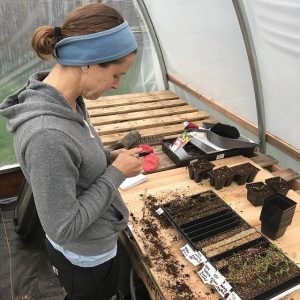 farmers are now having to either go direct to consumer for the first time, or are having to ramp up the direct to consumer efforts they already had. Either way, farmers are having to market and sell their products in vastly different ways. “We took this as an indicator that we need to do something for our local food system and the farmers in the area to help them have another avenue of marketing and advertising so that they can keep focusing on production and stewardship,” says White.
farmers are now having to either go direct to consumer for the first time, or are having to ramp up the direct to consumer efforts they already had. Either way, farmers are having to market and sell their products in vastly different ways. “We took this as an indicator that we need to do something for our local food system and the farmers in the area to help them have another avenue of marketing and advertising so that they can keep focusing on production and stewardship,” says White.
WSU program helps tri-county farmers grow their operations
How does a small farm in Clallam, Jefferson, or Kitsap County plan to finance and  expand its business into a regional market? What can farmers do to reduce carbon and greenhouse gas emissions from their agricultural systems? How does a farm add value to its current farm products in order to increase income?
expand its business into a regional market? What can farmers do to reduce carbon and greenhouse gas emissions from their agricultural systems? How does a farm add value to its current farm products in order to increase income?
Researchers from Washington State University Extension’s Community and Economic Development Unit established the Regional Small Farms Program to help small farm owners in the tri-county area come up with personalized solutions to these kind of important questions.
The USDA Census of Agriculture indicates that the tri-county area has over 1500 farms, and roughly half of those are new and beginning farms. Of these farms, about 90% depend on off-farm income to operate. As many of the small farms in the region look to expand their sales and enter into regional markets, they face constraints in business planning, financing strategies, marketing, and infrastructure access. More established farmers require technical support to increase their farm’s production, or specific scientific support concerning their livestock and/or crops.
In order to help both new and established farmers on the Olympic and Kitsap Peninsulas address these challenges, the CED’s Regional Small Farms program delivers intensive and scale-appropriate workshops, clinics, and field days to enhance sustainable land management practices, strengthen knowledge of farm business management, and develop curriculum for farm internship programs.
Local farmer starts library focused on regenerative agriculture
 Michael Pilarski has been collecting books on agriculture and earth repair for 40 years. Now, with a library of information at his fingertips, he wants to share it with Jefferson County’s citizens.
Michael Pilarski has been collecting books on agriculture and earth repair for 40 years. Now, with a library of information at his fingertips, he wants to share it with Jefferson County’s citizens.
“Most of my spare income over the years has gone to accumulate these books,” he said, sitting in his new public reference library that is covered wall-to-wall with books.
WSU Extension also has a selection of books on small-scale farming, says Kellie Henwood, the small farms coordinator, as well as quite a few editions of the Small Farmers Journal that people can reference.
“This is a classic journal from Lynn Miller that started out for horse-drawn farming practices, but has gained popularity in the small farms world,” Henwood said. “We had a generous donation from a local person of her collection.” But when it comes to size, Pilarski likely has the largest collections of books on ecosystem restoration and regenerative agriculture in the entire county.”
He hopes it will become a space where young farmers, gardeners and anyone who is interested will come to learn and become more dedicated to regenerative agriculture and earth repair.
Microsoft Features: High Speed Internet in Rural America
 Situated in the northeastern corner of Washington state, Ferry County is a mountainous, forested, ruggedly beautiful region. Bordered by Canada to the north and the Columbia River on the east, it’s the state’s fourth most sparsely populated county; the largest town, Republic, founded by gold prospectors in the late 19th century, has fewer than 1,000 residents.
Situated in the northeastern corner of Washington state, Ferry County is a mountainous, forested, ruggedly beautiful region. Bordered by Canada to the north and the Columbia River on the east, it’s the state’s fourth most sparsely populated county; the largest town, Republic, founded by gold prospectors in the late 19th century, has fewer than 1,000 residents.
The county’s gold mines and all but one sawmill are now closed, and the region has struggled in recent years to attract people and businesses. The lack of broadband is a major reason, says Trevor Lane, an assistant professor and the director of community and economic development for Washington State University’s extension office in Republic.
“If you’re not in town, you don’t have any kind of reliable broadband,” he says. “It’s impeding our ability to attract businesses. I know of three businesses that had to go elsewhere because we don’t have sufficient broadband.”
To read more of this Microsoft Feature, click here: https://news.microsoft.com/features/how-high-speed-internet-is-bringing-people-out-of-the-dark-ages-to-reshape-work-and-life-in-rural-america/
- 2019
-
WSU Extension Publication: January 2019
 Extension professionals are increasingly asked to convene communities facing conflict, including complex social, economic, environmental and technological situations. A collaborative process with facilitated problem solving can be an effective way to address such circumstances. Given their complex nature and the range of involved parties, convening and facilitating collaborative processes requires specific skills and methods. One important such method is a situation assessment, which involves interviewing a range of involved parties to understand interests, likely challenges, and opportunities. A situation assessment is a reliable first step to determine the feasibility and design of a collaborative process. This Framework for Conducting Situation Assessments is intended to provide guidance on conducting situation assessments for university Extension professionals. It offers a framework for conducting a situation assessment that allows for adaptation and tailoring to meet unique needs of Extension programs.
Extension professionals are increasingly asked to convene communities facing conflict, including complex social, economic, environmental and technological situations. A collaborative process with facilitated problem solving can be an effective way to address such circumstances. Given their complex nature and the range of involved parties, convening and facilitating collaborative processes requires specific skills and methods. One important such method is a situation assessment, which involves interviewing a range of involved parties to understand interests, likely challenges, and opportunities. A situation assessment is a reliable first step to determine the feasibility and design of a collaborative process. This Framework for Conducting Situation Assessments is intended to provide guidance on conducting situation assessments for university Extension professionals. It offers a framework for conducting a situation assessment that allows for adaptation and tailoring to meet unique needs of Extension programs.Read more on this publication here.
Dominican Republic visit could help elevate farmers above subsistence
 Farmers around the city of Dajabón, Dominican Republic, are mostly subsistence farmers, only able to grow enough food for themselves and their families to eat. WSU researchers, in partnership with the Rotary Club of Everett, are working to help those farmers increase their harvest so they can sell their produce at market.
Farmers around the city of Dajabón, Dominican Republic, are mostly subsistence farmers, only able to grow enough food for themselves and their families to eat. WSU researchers, in partnership with the Rotary Club of Everett, are working to help those farmers increase their harvest so they can sell their produce at market.“This project aims to enhance family income through family greenhouse gardens,” said Anthony Gromko, WSU Extension assistant professor of economic and community development. “This is a poverty alleviation effort, where we can empower families to increase their economic resiliency.”
Last month, Gromko and WSU Everett Chancellor Paul Pitre visited Dajabón, a city of around 35,000 along the border with Haiti, to meet with local nongovernmental organizations (NGOs) and professors from Universidad ISA, an agricultural university about three hours away. Ed Peterson represented the Rotary Club of Everett on the trip as well.
For more information on this project, visit: https://news.wsu.edu/2019/02/14/dominican-republic-visit-help-elevate-farmers-subsistence/.
Conference targets high-speed internet access on Peninsula
 Monica Babine of Washington State University’s Program for Digital Initiatives, WSU Stevens County Extension Director Debra Hansen, and Karen Perry of the National Telecommunications & Information Administration Broadband USA program provided an introduction on how to form broadband action teams and will facilitate breakout groups through the process.
Monica Babine of Washington State University’s Program for Digital Initiatives, WSU Stevens County Extension Director Debra Hansen, and Karen Perry of the National Telecommunications & Information Administration Broadband USA program provided an introduction on how to form broadband action teams and will facilitate breakout groups through the process.For more information on this conference, click here: https://www.peninsuladailynews.com/news/conference-targets-high-speed-internet-access-on-peninsula/
SNAP-Ed Program Looks to Expand Reach in Lewis County
 SNAP-Ed, the nutrition education program run through the Washington State University extension, is broadening its outreach in Lewis County, aiming to help more people learn how to eat healthy on a budget.
SNAP-Ed, the nutrition education program run through the Washington State University extension, is broadening its outreach in Lewis County, aiming to help more people learn how to eat healthy on a budget. “In Lewis County, 21 percent of individuals are on SNAP benefits, so fairly high,” said Elizabeth Stratton, the SNAP-Ed program manager for the region. “The places that we’re focusing SNAP-Ed work in Lewis County are in schools, farmers markets and food banks. … We’re helping to encourage them to eat healthy and stay physically active.”
The Supplemental Nutrition Assistance Program is federally funded, providing benefits to help low-income individuals purchase basic food needs. SNAP-Ed seeks to bolster that assistance with education. The SNAP-Ed program is funded by the U.S. Department of Agriculture, Washington State University and local partners.
Read the article here: http://www.chronline.com/news/snap-ed-program-looks-to-expand-reach-in-lewis-county/article_36440bc8-7d7b-11e9-85ed-678b956d890e.html
Small farms, large aspirations
 The small farm trend has not escaped state and university officials, who are working to put together programs to help more small farms to flourish and prosper.
The small farm trend has not escaped state and university officials, who are working to put together programs to help more small farms to flourish and prosper.Laura Lewis, director of the Food Systems Program at Washington State University, said she is troubled by the erosion of mid-size farms. The good news, however, is that more small farmers seem eager to become involved, which she attributes to the popularity of the farm-to-table movement.
“It’s wonderful to see that we’re adding new farms,” Lewis said. “Some of these smaller-scale farms are really starting to get a better foothold economically.”
Part of that has to do with resources provided by the Food Systems Program, run by a team of 100 WSU staff and community organizations. One program, called “Cultivating Success,” works specifically with new and beginning farmers and was developed in collaboration with the University of Idaho.
Land-grant universities and extension services in other states also have small-farm programs. They work with nonprofits to offer classes and teaching farms where new farmers can learn the trade, and some organizations offer internships for new farmers.
For more information, click here: https://www.capitalpress.com/ag_sectors/smallfarm/small-farms-large-aspirations/article_eec61b24-7807-11e9-81b0-2fe07928665b.html
WSU Extension: A leader in wildfire response and recovery
 With offices in every county statewide, WSU Extension brings expertise in disaster mitigation, response and recovery.
With offices in every county statewide, WSU Extension brings expertise in disaster mitigation, response and recovery.Its wildfire recovery website is packed with information, contacts and links to key agencies and services, including status updates on ongoing fires, preparedness and access to a wide variety of other resources related to the agriculture, economic and health impacts of wildfires.
WSU Extension is also an active member of the Extension Disaster Education Network (EDEN), which provides resources for extension professionals and the public on critical issues related to disasters including wildfires.
Michael J. Gaffney, acting director of WSU Extension, is also chief of the Washington State Law Enforcement Mountain Operations School. He is a FEMA-certified emergency management trainer and formerly served as the director of the WSU Office of Emergency Management for six years.
Find more information here: https://news.wsu.edu/experts-research-news-resources-wildfire-season/.
Society and Natural Resources Journal: August 2019
 Ruckelshaus Center Director, Michael Kern, is co-author of a recently published article, “How Collaborative Governance Practitioners Can Assess the Effectiveness of Collaborative Environmental Governance While Also Evaluating Their Own Services”, via Society and Natural Resources Journal. The article evaluates the methodology of collaborative governance as it pertains to environmental issues.
Ruckelshaus Center Director, Michael Kern, is co-author of a recently published article, “How Collaborative Governance Practitioners Can Assess the Effectiveness of Collaborative Environmental Governance While Also Evaluating Their Own Services”, via Society and Natural Resources Journal. The article evaluates the methodology of collaborative governance as it pertains to environmental issues.Credit classes offered on Whidbey Island
 Washington State University Everett is teaming up with the Island County extension office to broaden educational opportunities in the area.
Washington State University Everett is teaming up with the Island County extension office to broaden educational opportunities in the area.Beginning this fall semester, WSU Everett students will be able to take courses at the WSU Extension Island County office in Coupeville, which is an hour and half drive away from the Everett campus on Whidbey Island.
More information can be found here: https://news.wsu.edu/2019/08/27/credit-classes-offered-wsu-extension-island-county-office-coupeville/.
William D. Ruckelshaus Center hosts 9th annual Chairman’s Circle Luncheon
 The William D. Ruckelshaus Center hosted its 9th annual Chairman’s Circle Luncheon on Sept. 13 at the Washington State Convention Center. The event featured Robert Siegel, former host of NPR’s All Things Considered, and honored the Center’s Founder and Chairman Bill Ruckelshaus.
The William D. Ruckelshaus Center hosted its 9th annual Chairman’s Circle Luncheon on Sept. 13 at the Washington State Convention Center. The event featured Robert Siegel, former host of NPR’s All Things Considered, and honored the Center’s Founder and Chairman Bill Ruckelshaus.Check out the article from WSU Insider here: https://news.wsu.edu/2019/08/15/william-d-ruckelshaus-center-hosts-9th-annual-chairmans-circle-luncheon/
Giving Compass: Creating Collaborative Solutions
 Ruckelshaus Center Director, Michael Kern, recently penned an article for the Giving Compass. The article focused on the Center’s commitment to finding collaborative solutions and what steps organizations can take in order to create collaborative solutions of their own. To read the article, click here.
Ruckelshaus Center Director, Michael Kern, recently penned an article for the Giving Compass. The article focused on the Center’s commitment to finding collaborative solutions and what steps organizations can take in order to create collaborative solutions of their own. To read the article, click here.WSU Colville Reservation Extension team honored with national teamwork award
 WSU Colville Reservation Extension educators and tribal program partners were honored by a national organization this fall for their efforts in helping tribal communities thrive through food garden education.
WSU Colville Reservation Extension educators and tribal program partners were honored by a national organization this fall for their efforts in helping tribal communities thrive through food garden education.Kayla Wells, Family and Consumer Sciences Educator for WSU Colville Reservation Extension and director of WSU Okanogan County Extension, and team members Linda McLean, Director and 4-H Educator with WSU Colville Reservation Extension; Tabitha Parr, Office Assistant with WSU Colville Reservation Extension; and Dorothy Palmer, Program Manager for the Colville Confederated Tribes Low Income Heating Energy Assistance Program, were recognized at the 85th annual session of the National Extension Association for Family and Consumer Sciences (NAEFCS), in Hershey, Penn.
This team received the association’s second-place National Award, first place Western Region Award, and first-place State Award for Excellence in Teamwork.
For more information, click here.
Remembering Bill Ruckelshaus, William D. Ruckelshaus Center Founder
 On November 27, 2019, Bill Ruckelshaus, founder of the William D. Ruckelshaus Center, passed away in his Seattle home. The Ruckelshaus Center announced his passing and expressed the Center’s profound sadness in a letter from the Ruckelshaus Center’s Director and its Advisory Board Chair. Read the letter here.
On November 27, 2019, Bill Ruckelshaus, founder of the William D. Ruckelshaus Center, passed away in his Seattle home. The Ruckelshaus Center announced his passing and expressed the Center’s profound sadness in a letter from the Ruckelshaus Center’s Director and its Advisory Board Chair. Read the letter here.For more information on Bill, watch the video that highlights Bill’s legendary career here.
- 2018
-
Governors discuss leadership, balance at Ruckleshaus Center joint luncheon
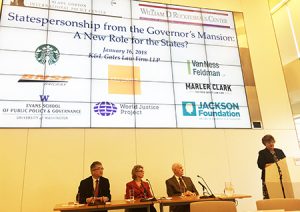
On Tuesday, Jan. 16, the William D. Ruckelshaus Center and the Slade Gorton International Policy Center featured former Washington State Governors Daniel Evans, Christine Gregoire, and Gary Locke, at their fifth annual joint luncheon.
The luncheon was titled “Statespersonship from the Governor’s Mansion: A New Role for the States,” featured a discussion moderated by Renee Radcliff Sinclair of TVW.
The former governors reflected on their views and personal experiences in governing the state, and how the balance of power and leadership between state governments and the federal government may be changing.
The event can be viewed on the Ruckelshaus Center site or the TVW website.
The Ruckleshaus Center is a joint effort of WSU Extension and the University of Washington Evans School of Public Policy and Governance.
Journal of Extension: February 2018: Volume 56, Number 1

 Center Director Michael Kern authored an article in the Journal of Extension entitled Developing and Managing an Advisory Board to Support Extension-Based Centers and Other Programs. Additionally, Project and Development Lead, Chris Page, authored an article published in the Journal of Extension entitled Creating and Implementing Diverse Development Strategies to Support Extension Centers and Programs.
Center Director Michael Kern authored an article in the Journal of Extension entitled Developing and Managing an Advisory Board to Support Extension-Based Centers and Other Programs. Additionally, Project and Development Lead, Chris Page, authored an article published in the Journal of Extension entitled Creating and Implementing Diverse Development Strategies to Support Extension Centers and Programs.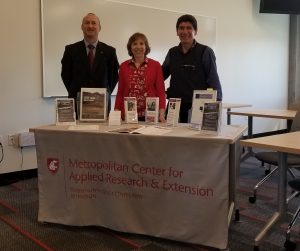 The Metro Center Awarded: Innovative and Creativity – Team for 2018
The Metro Center Awarded: Innovative and Creativity – Team for 2018The Metropolitan Center for Applied Research and Extension was recently announced as a national award winner by the National Association of Community Development Extension Professionals (NACDEP).
The award, ‘Innovative and Creativity: Team for 2018’ recognizes the Metro Center for their community development work, program accomplishments, research effectiveness, and their collaboration with others to help meet community development needs.
All awards will be presented during the NACDEP Conference, June 10-13 in Cleveland, Ohio. The national awards will be presented at the banquet on Tuesday, June 12 at 7 p.m. Regional awards will be presented during the regional meetings on Monday, June 11 at 4:15 p.m.
 Food-Energy-Water Nexus; Urban Systems Analysis
Food-Energy-Water Nexus; Urban Systems AnalysisMetro Center Director, Brad Gaolach, describes how our food, energy, and water systems are inextricably linked. Changes in one system result in changes in the other systems. Management decisions in one system also change the other two. With an increases in population and the impacts of climate change, the world needs to address this grand challenge by finding both global and local solutions. Brad describes how this Food-Energy-Water Nexus plays out in the Puget Sound region.
Watch full video here.
- 2017
-
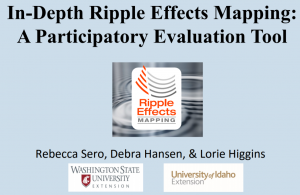
NACDEP Innovation and Creativity Team Award Winning: National Level Award and Western Regional Award
Ripple Effects Mapping: Engaging participants in capturing results and untold stories of success
Measuring condition change is challenging for all Extension programs, and very challenging for documenting change in economic and community development. Ripple Effects Mapping (REM) is a group participatory evaluation strategy for developmental and impact evaluation. The method engages program participants and stakeholders to retrospectively and visually map the chain of effects resulting from a program or complex collaboration. It is a highly participatory method, treating program stakeholders as integral, active participants in the evaluation process, rather than as passive recipients of program evaluation results. REM is engaging and interactive, iterative and conclusive, and is adaptable to unique contexts.
Project Lead by: Debra Hansen, Lorie Higgins and Rebecca Sero
Learn more about Ripple Effects Mapping
NACDEP Educational Technology Team Award Winning: National Level Award and Western Regional Award
Washington Rural Pathways to Prosperity Conference “Small Business is Everybody’s Business” achieves wide-ranging success using a new model of delivery.
Washington State University’s Rural Pathways to Prosperity (P2P) is a statewide economic development leadership conference that uses a unique hybrid delivery model to reach rural communities, revive the economy, and strengthen the entrepreneurial ecosystem. P2P uses technology to connect multiple sites simultaneously to provide an interactive webinar featuring a national expert. Well-designed and adaptable activities facilitated by local community leaders address issues and opportunities introduced by the speaker and regional participants. Small business owners and entrepreneurs also participate at local sites, allowing them to leverage the knowledge gained and apply it as well to their business goals and aspirations.
Project lead by: Monica Babine, Debra Hansen, Margaret Viebrock, Carrie Backman, Gary Fredricks, Sheila Gray, Mark Heitstuman, Krisan Lehew, Laura Lewis, AnaMaria, Martinez, Rob McDaniel, Clea Rome, and Jordan Tampien
Learn more about NACDEP

WSU Metropolitan Center for Applied Research and Extension’s post-landslide Economic Prosperity Efforts
February 2017
The massive Oso landslide killed 43 people, caused extensive flooding, and destroyed a key highway north of Everett in 2014, pushing the communities of Arlington and Darrington to their breaking point. Working in partnership with the two municipalities, the Economic Alliance Snohomish County, and numerous local partners, the Metro Center has steadily guided the communities in their quest for sustainable economic prosperity.
Project Lead by: Martha Aitken, Brad Gaolach and Anthony Gromko
Visit the Metro Center’s website to read the full article: Call it the Urban Extension
Learn more about the Metro Center and the services that they offer.
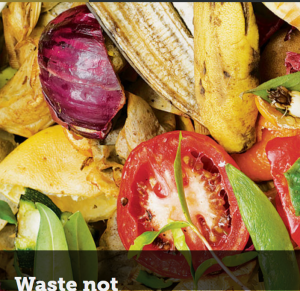 WSU Clallam County Extension’s Waste Reduction & Food Recovery Program- Featured in Washington State Magazine’s Spring 2017 Issue
WSU Clallam County Extension’s Waste Reduction & Food Recovery Program- Featured in Washington State Magazine’s Spring 2017 IssueApril 2017
Clallam County Extension agents work within their communities to reduce food waste through gleaning and other food recovery programs to redirect vegetables and fruits to food banks and people without enough food. Clea Rome, director of Clallam County Extension, says “Extension is a unique spot to connect different aspects of the food system and make it more equitable through food recovery”. Gleaning has also had substantial effects on the county. Karlena Brailey, a nutrition coordinator for Clallam County Extension, recently gave away 2,500 pounds of locally gleaned apples and pears to families in the Port Angeles School District. She is also working on a project to turn some of those gleaned apples into apple sauce, which will be distributed to clients at meal sites and food banks.
Project Lead by: Clea Rome, Meggan Uecker and Karlena Brailey
Visit Washington State Magazine’s website for full article: Waste Not
Learn more about Clallam County’s Waste Reduction Program
An Announcement From Rob McDaniel, CED Program Director, Regarsding Recent CED Promotions
April 2017
“Since the CED Unit was formed in 2011 it has been my pleasure to see Extension colleagues promote through the faculty ranks. Promotion is a statement of a faculty’s accomplishments and the recognition by Wash
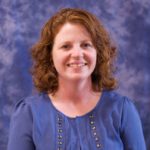 ington
ington  State University of their contribution to the State and the constituencies they serve. I am proud to announce that Caroline (Carrie) Backman and Michael Kern (both pictured left) will be promoted to Associate Professor on July 1, 2017.”
State University of their contribution to the State and the constituencies they serve. I am proud to announce that Caroline (Carrie) Backman and Michael Kern (both pictured left) will be promoted to Associate Professor on July 1, 2017.”-Rob McDaniel, CED program director
Urban Extension: Aligning with the Needs of Urban Audiences Through Subject-Matter Centers
May 2017
The educational program model is the principle approach Extension uses to deliver on its mission of “taking knowledge to the people.” However, with county-based faculty fully engaged in long-term program delivery, they may have little or no capacity to address emerging issues faced by urban communities. Urban governments often seek the research capacity of a university in addition to, or instead of, the traditional Extension programming model but sometimes turn first to other urban-serving universities. Washington State University Extension has addressed these challenges by establishing subject-matter centers. This article examines how subject-matter centers can add capacity to traditional Extension offices in order to be responsive to emerging local needs, suggesting models that other university Extension programs may use or adapt to their local communities. These models also foster more community engagement and articulate greater public value for the institution as a whole.
Read the full article: Urban Extension: Aligning with the Needs of Urban Audiences Through Subject-Matter Centers.
Written by: Brad Gaolach, Michael Kern and Christina Sanders
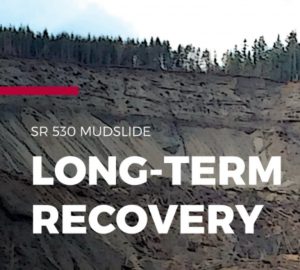 SR 530 Mudslide: Long Term Recovery Report
SR 530 Mudslide: Long Term Recovery ReportMay 2017
On March 22, 2014, a catastrophic landslide affected several communities in northwest Washington when an unstable hillside gave way. A wall of mud buried an entire neighborhood, taking 43 lives, and closing State Highway 530, the physical and economic lifeline for the region. In response to the disaster, Washington State University (WSU) assembled a multi-disciplinary team to support the long-term recovery of the impacted communities.
Visit the following link to read more about WSU’s long-term recovery report.
For additional resources on SR 520 Mudslide recovery efforts, visit the Metro Center’s project page.
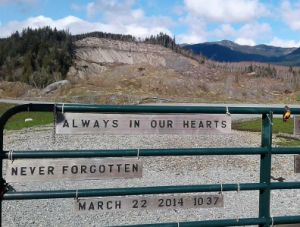 Revised Community Revitalization Plan
Revised Community Revitalization PlanJune 2017
A follow-up report that describes the communities progress over the past 11 months of implementation and future goals centered around infrastructure, industries and employment, community and workforce development, resilience and sustainability, place-making, and rural innovation.
Read the full article: Revised Community Revitalization Plan – Arlington and Darrington
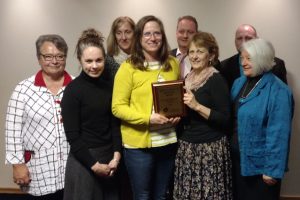 National award for Extension’s positive ripple map program
National award for Extension’s positive ripple map programJuly 2017
WSU Extension faculty and colleagues have won the National Association of Community Development Extension Professionals (NACDEP) – Community Development Society (CDS) Team Award for their innovative Ripple Effects Mapping (REM) tool.
The WSU-created REM tool collects the untold stories and behind-the-scene activities that ripple out from community programs and activities.
Debra Hansen, director of WSU Stevens County Extension; Rebecca Sero, evaluation specialist and assistant professor at WSU Spokane; Lorie Higgins, WSU Extension adjunct and extension specialist; associate professor at the University of Idaho; along with colleagues from the University of Minnesota and South Dakota State University, were presented with the 2017 Joint NACDEP–CDS Team Award at the national conference on June 14. The award exemplifies the society’s principles of good practice as well as the vision of NACDEP, and recognizes the team’s creation, refinement, and work using REM across five states. The team was recognized for their generosity in sharing the technique, and for the benefits it provides for communities.
Learn more about Ripple Effects Mapping
Originally published in WSU CAHNRS News
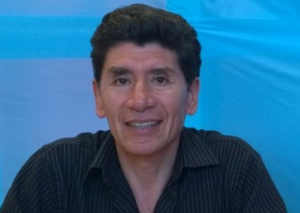 Diversity award, new article on Latino business for García-Pabón
Diversity award, new article on Latino business for García-PabónJuly 2017
José García-Pabón, an associate professor in Extension Community and Economic Development and Latino Community Studies and Outreach specialist, has earned National Association of Community Development Extension Professionals (NACDEP) honors in diversity for 2017. He placed second nationally and won top honors in the Western region. The awards were presented at the NACDEP-CDS Joint Conference, June 11-14 in Big Sky, Mont.
Through his Extension program, García-Pabón delivers educational resources to Latino families to help them engage with their communities and improve their families’ well-being in areas including entrepreneurship, youth leadership, sustainable farming, empowerment of women, and training.
García-Pabón also recently published “Latino small businesses in northwest Washington: Perceptions, challenges, and needs” in the latest issue of the Journal of Community Development. He surveyed Latino small business owners to learn about the factors that influence their success or failure. Most want business advising and training, and find satisfaction in owning their own businesses.
Read the article: Latino small businesses in northwest Washington: Perceptions, challenges, and needs
Originally published in WSU CAHNRS News
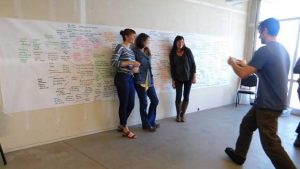 A Field Guide to Ripple Effects Mapping: Available Free Online
A Field Guide to Ripple Effects Mapping: Available Free OnlineOctober 2017
We are excited to share a just published, free online resource: A Field Guide to Ripple Effects Mapping (pdf.) co-edited by WSU faculty Debra Hansen, Rebecca Sero, and adjunct Lorie Higgins from the University of Idaho; along with Scott Chazdon, University of Minnesota and Mary Emery, South Dakota State.
This Ripple Effects Mapping (REM) team has won three national awards for their work through the National Association of Community Development Extension Professionals, American Evaluation Association, and the Community Development Society.
Discover more about REM by visiting the WSU Extension Project & Program Evaluation page.
Read Publication: A Field Guide to Ripple Effects Mapping (pdf.)
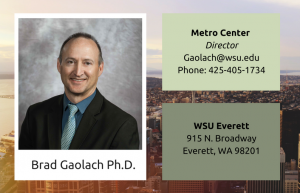 Journal of Extension – October 2017 – Volume 55, Number 5
Journal of Extension – October 2017 – Volume 55, Number 5October 2017
Congratulations to the Metropolitan Center for Applied Research and Extension’s director, Brad Gaolach, for his co-authored article on A National Framework for Urban Extension.
The Journal of Extension (JOE) creates opportunities for professionals and students to publish intellectual, creative work; nurtures emerging scholars and new authors for success; encourages professional development; and advances the theory and practice of Extension.
JOE is a rigorous, peer-reviewed journal that brings the scholarship of university outreach and engagement to educators and practitioners around the world. The acceptance rate for manuscripts submitted to JOE is currently 24.5%.
Read publication: A National Framework for Urban Extension
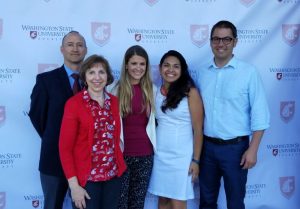 Extension, Metro Center Unite Communities to Solve Health Challenges
Extension, Metro Center Unite Communities to Solve Health ChallengesExtending science to serve communities is what Extension is all about. And when it comes to health, entire communities—from youth to elders, rural and urban—must band together to find solutions.
The Culture of Health partnership unites thousands of communities in a 10-year effort to tackle the challenges they face when it comes to health. Funded by the Robert Wood Johnson Foundation, the nation’s largest health philanthropy organization, and led by the National 4-H Council, with assistance from the Metropolitan Center for Applied Research and Extension at WSU, the new Metro Center partnership aims to solve health challenges like chronic disease and rising healthcare costs.
Article originally published in CAHNRS News
Learn more about the Metropolitan Center for Applied Research and Extension
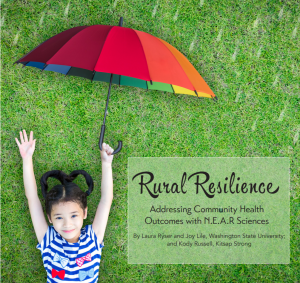 Rural Resilience: Addressing Community Health Outcomes with N.E.A.R Sciences
Rural Resilience: Addressing Community Health Outcomes with N.E.A.R SciencesNovember 2017
Congratulations to Laura Ryser for her co-authored article Rural Resilience: Addressing Community Health Outcomes with N.E.A.R Sciences in the Fall 2017 Rural Connections Issue. The article discusses the importance of developing a resilient and thriving community ecosystem in order to address the lifelong effects of adversity for those who have experienced high levels of toxic stress in childhood and adulthood.
The instructive magazine, Rural Connections, informs the nation on timely research and activities by the West’s land-grant institutions and regional/national agencies as it relates to rural development issues in the region.
Read full article: Addressing Community Health Outcomes with N.E.A.R Sciences (pdf.)
View the full issue: Fall 2017 Rural Connections (pdf.)
 The Ruckelshaus Center on TVW
The Ruckelshaus Center on TVWTVW’s weekly show, The Impact focused on the work of the Ruckelshaus Center in a ten-minute interview with Michael Kern, Director of the Ruckelshaus Center. Watch the interview.
- 2015
-
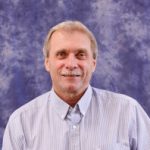 Dan Fagerlie Receives National Award
Dan Fagerlie Receives National AwardDan Fagerlie has won the 2015 NACDEP Diversity Award for his efforts in partnership with the Colville Confederated Tribes and his work as the WSU Extension Tribal Liaison.
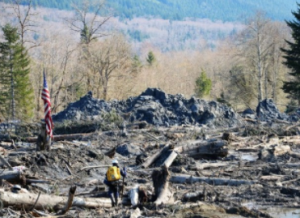 Extension’s SR 530 Mudslide Recovery Team Receive National Award
Extension’s SR 530 Mudslide Recovery Team Receive National AwardWSU Extension’s SR 530 Mudslide Recovery Team, lead by Curt Moulton and Mike Gaffney, have received the NACDEP 2015 National award for Excellence in Teamwork.
Learn more about the SR 530 Landslide Commission
 Debra Hansen and Monica Babine Receive National Award
Debra Hansen and Monica Babine Receive National AwardDebra Hansen and Monica Babine have received the 2015 Leadership and Collaboration Award of Excellence from the University Economic Development Association for their development of the Rural Pathways to Prosperity (P2P) Conference.
“We are proud of this national recognition for the Rural Pathways to Prosperity conference,” said Rich Koenig, associate dean and director of WSU Extension. “It is a great example of how WSU brings the resources of federal, state and regional partners together to strengthen the vitality of Washington towns.”
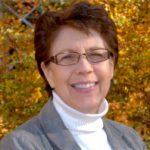
Debra Hansen and Monica Babine developed P2P as a more easily accessible resource for rural small businesses to continue thriving, growing, and creating jobs. Even though small businesses comprise more of Washington’s rural economies than their urban counterparts, conferences and other learning opportunities are almost always located in urban centers, creating time and money barriers for rural community leaders and business owners.
